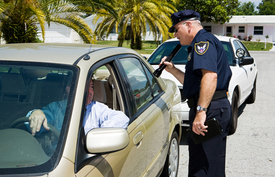 Whether you’ve had one drink or five, seeing blue and red lights in your car’s rearview mirror can instantly provoke feelings of stress and fear. “Am I speeding?” you ask yourself. “Will I have to take a breathalyzer?” You may be aware of your basic rights, but the law of implied consent is a confusing one at best. There are a few things you should know about implied consent whether you’re a newly licensed driver or on the hunt for a Los Angeles DUI defense attorney to represent your case.
Whether you’ve had one drink or five, seeing blue and red lights in your car’s rearview mirror can instantly provoke feelings of stress and fear. “Am I speeding?” you ask yourself. “Will I have to take a breathalyzer?” You may be aware of your basic rights, but the law of implied consent is a confusing one at best. There are a few things you should know about implied consent whether you’re a newly licensed driver or on the hunt for a Los Angeles DUI defense attorney to represent your case.
What is implied consent? Simply stated, implied consent, as it pertains to DUI cases, is the permission you’ve given to be tested for alcohol levels when the police have probable cause to arrest you for DUI solely on the basis of having a driver’s license. While this may seem contradictory to your freedoms against unlawful self-incrimination and search and seizure, the United States considers the act of driving a privilege rather than a right.
How does it work? Say you’re stopped by a police officer after having a couple drinks at happy hour with your coworkers. You feel slightly “buzzed” but not drunk, and remember hearing that you have the right to refuse a field sobriety test so you do. Fair enough; but then the cop instructs you to submit to a breath test at the scene. What do you do? Your options are either to agree and hope your results produce a blood alcohol concentration under .08 percent or refuse. You are not required to submit to the hand held breath machine at the location of the investigation. If arrested, then you have to take a blood or breath test, and if refused there is a longer license suspension. If you didn’t come to a complete stop at a stop sign, for example, that otherwise minor moving violation is now enough evidence for the officer to arrest you under suspicion of driving under the influence. It doesn’t matter that you refused to take a sobriety test; you’re now facing a driver’s license suspension at the very least. Worse yet, if convicted of a DUI, fines and other penalties will be more severe for the refusal to submit to testing.
What can you do to protect yourself? With an understanding of implied consent law, you’re already better equipped to deal with an officer who questions how much you’ve had to drink. If arrested in Southern California, your Los Angeles DUI defense attorney can advise you on the next course of action and what to expect in court. And while you may feel disheartened knowing you can’t change the law of implied consent, it is still helpful to read the fine print. California Vehicle Code section 23612 lists an officer’s duties which include advising you of your option to submit to either a blood or breath test along with the consequences of outright refusal.
The road to a DUI conviction or acquittal will undoubtedly be difficult, but knowing how implied consent affects your rights gives you the upper hand. Every situation is unique and the appropriate actions of one driver may not be advantageous to the next. And while implied consent may seem like one big grey area, your right to remain silent is not. Once the handcuffs are on, be respectful and cooperative but do not voluntarily divulge any information until an experienced Los Angeles DUI defense attorney can review your case.
Call or email Jon Artz if you would like to discuss your case in confidence with an experienced Los Angeles DUI Attorney.


